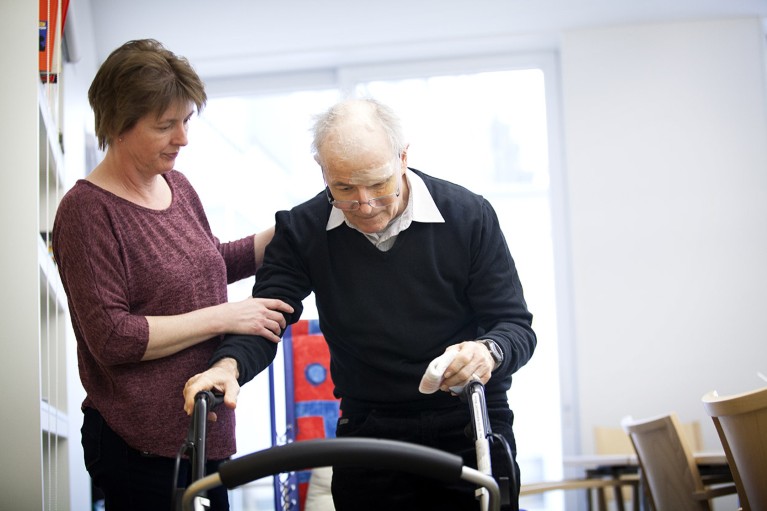

A carer helps a patient in a Swiss day-care centre for people suffering from Parkinson’s disease.Credit: Amelie-Benoist/BSIP/Science Photo Library
A study of quarter of a million people with autism, intellectual disabilities or both has found that their risk of developing symptoms associated with Parkinson’s disease is three times that in the general population.
The study is the largest of its kind, and warrants further investigation into the links between these conditions, researchers say. The findings were presented at the annual meeting of the International Society for Autism Research in Melbourne, Australia, on 16 May, and have not yet been peer reviewed.
The results are “a big deal as we think about planning and what we should be screening or looking for as autistic people age”, says study co-author Gregory Wallace, a developmental neuropsychologist at George Washington University in Washington DC.
Robert Hendren, a psychiatrist at the University of California, San Francisco, agrees. “The better prepared people can be, then the better chance there is of minimizing the effects, or maybe even eliminating them,” he says.
Changing understanding
There have been few studies on health effects experienced by autistic adults as they age. When autism was first described1 in the 1940s, “it was seen as a disorder of infants”, says Joseph Piven, a psychiatrist at the University of North Carolina at Chapel Hill.
Autism did not become a distinct diagnosis until the 1970s, and the criteria for characterizing it have been changed several times since then. These changes — in addition to the difficulty of recruiting ageing participants into studies — have made it difficult to follow individuals over long term, Wallace says.
“Part of the reason we know so little about this, and why this is in its infancy, is because we know so little more broadly about ageing and autism,” says Wallace.
Previous studies have suggested that autistic people have disproportionately high rates of parkinsonism — symptoms common in Parkinson’s disease, including tremors, sudden freezing while walking and difficulty holding a posture — compared with the general population. One of the first studies to investigate this, published in 2015 by Piven and his colleagues2, looked at 37 adults with autism and found that 12 had parkinsonism. But small sample sizes have undermined the reliability of findings.
“Many autistic people, when they’re younger, have motoric symptoms, or issues with motor functioning,” says Wallace. “We want to figure out if it is a parkinsonism, a broader array of these motoric features, or is it a neurodegenerative process,” he adds.
Genetic studies have also found that autism is linked to mutations in the PARK2 gene, which is also associated with Parkinson’s disease3.
Wallace and his collaborators reviewed three years’ worth of medical records (spanning 2014–2016) for 247,539 people in the United States aged 45 and older. Of these, 23,686 had autism; 223,853 were not autistic but had an intellectual disability; and 13,302 had both.
The records showed diagnoses of parkinsonism in 5.98% of the autistic people who had no intellectual disability, 6.01% of people who had an intellectual disability but were not autistic and 7.31% of those with both conditions. Everyone diagnosed with parkinsonism was more than 55 years old.
These rates are much higher than in the general population, where between 0.11% and 1.85% of people in the same age group have Parkinson’s-like symptoms.
Hidden factors
Parkinsonism could be linked to autism and intellectual disabilities by an as-yet unidentified facet of brain health or development, researchers say. The link could even be affected by medications. Studies in the United States report4 that 20–34% of children with autism are prescribed antipsychotic drugs to reduce behaviours considered ‘challenging’, such as irritability, aggression, self-injury and social withdrawal. Some antipsychotic drugs are known to cause parkinsonism as a side effect.
In a follow-up analysis also presented at the meeting, Wallace and his collaborators excluded people who had taken parkinsonism-inducing drugs during the study window. Their findings, seen by Nature, suggest that the rates of parkinsonism were still elevated even in this restricted group.
Researchers say future studies should look at the age of onset of parkinsonism to determine whether autistic people and those with intellectual disabilities experience the symptoms earlier than those in the general population.
“Critically, for us to understand if it’s neurodegenerative, we need to follow people over time,” says Wallace.
“We need to think about how to treat it,” says Piven. “We need to think about screening people with autism for parkinsonian features.” Hendren agrees. “It’s going to be a complex picture,” he says. “And we need to do it all together.”
Source link



